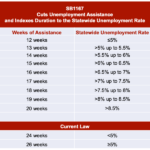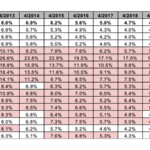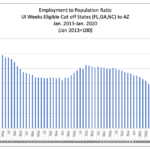 News
News
AZ Legislature Considers Cuts to Unemployment Benefits
March 13, 2023On Tuesday, March 14, members of the Arizona legislature’s House Commerce Committee will consider a bill that cuts the duration of unemployment insurance (UI) benefits and indexes total weeks of assistance to the statewide unemployment rate.
Arizona does not have a problem with overuse of its UI program. Only 1 in 6
unemployed Arizonans received UI benefits in the third quarter of 2022 and the average duration of benefits was 14 weeks. Reducing weeks of assistance will force some people to accept jobs that do not match their skill sets and pay less than their prior earnings, which is bad for workers as well as the economy.
Current law provides between 24 to 26 weeks of assistance depending on the
unemployment rate. SB1167 cuts benefits to 12 weeks if the unemployment rate is 5% or less and up to 20 weeks if the unemployment rate is more than 8.5%, with a total of nine different durations in between.
If enacted, this legislation will harm individuals and the economy, and will be costly to implement. Concerns with SB1167 follow.
SB1167 will disproportionately harm groups of people who typically experience unemployment at higher rates than the statewide average.
● Tribal areas in Arizona had an unemployment rate of 17.9% in 2019, 3 times
higher than the statewide average.
● People with disabilities in Arizona had an unemployment rate of 12.7% in 2017,
two and half times that state average of 4.9%.
● Black Arizonans had an unemployment rate of 5% and Hispanic people had an
unemployment rate of 3.7% in the second quarter of 2022, compared to a
statewide rate of 3.2%.
● People with lower levels of educational attainment had a higher unemployment
rate than the statewide average of 5.7% in 2021; the unemployment rate for
people with a high school diploma was 6.5% and 8.5% for people without a high
school diploma.
● Historically, most Arizona rural counties have unemployment rates higher than the state average.
Source: Arizona’s Economy: Economic and Business Research Center.
*Does not include 2020 due to the COVID-19 pandemic.
SB1167 jeopardizes the economy
The economy could be hurt if people drop out of the labor force when they are cut off from benefits before finding a job. These people are more likely to rely on other public assistance programs.
The Grand Canyon Institute found that limiting the duration of UI assistance did not correlate with improved labor market outcomes. This finding was based on a
comparison of Arizona’s employment-to-population ratio to that of Florida, Georgia and North Carolina — all pro-business states. Arizona’s UI benefits duration is longer than each of the other states. As can be seen in the graph, the index declined, suggesting that many people who did not find a job once their unemployment benefits expired exited the labor force in the three comparison states relative to Arizona.
SB1167 will cost state time and resources
- It places unwise and potentially detrimental burdens on Arizona’s existing
decades-old UI benefits system each time it has to be reprogrammed when the
unemployment rate passes a specified threshold. - It will cost additional the state Department of Economic Security staff time and
divert resources away from a significant UI technology modernization project,
potentially causing delays. - It will cause inevitable over- and underpayments to claimants due to the 3-week
lag in announcing the seasonally adjusted unemployment rate—this will require
DES staff to rectify benefit amounts for each claimant impacted.
Contact: Dave Wells, Research Director, dwells@azgci.org, 602-595-1025 Ext. 2.
Dave Wells holds a doctorate in political economy and public policy and is the Research Director for the Grand Canyon Institute.
The Grand Canyon Institute, a 501(c)(3) nonprofit organization, is a centrist think tank led by a bipartisan group of former state lawmakers, economists, community leaders, and academicians. The Grand Canyon Institute serves as an independent voice reflecting a pragmatic approach to addressing economic, fiscal, budgetary and taxation issues confronting Arizona.
The Grand Canyon Institute (GCI) is dedicated to informing and improving public policy in Arizona through evidence-based, independent, objective, nonpartisan research. GCI makes a good faith effort to ensure that findings are reliable, accurate, and based on reputable sources. While publications reflect the view of the Institute, they may not reflect the view of individual members of the Board.


